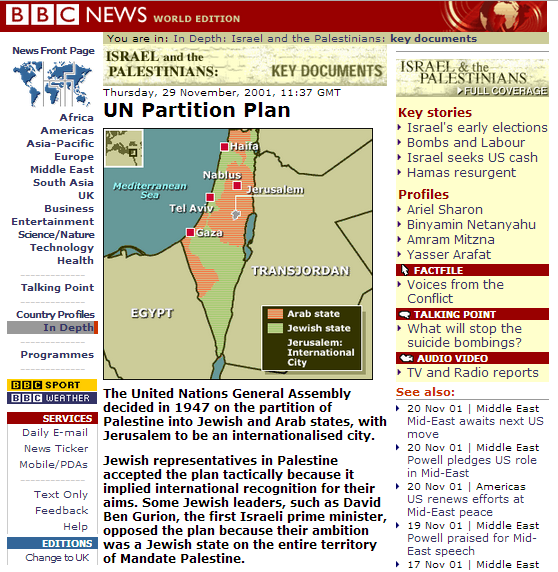Back in December 2013 we noted on these pages that an online BBC backgrounder on the topic of the 1947 Partition Plan (UNGA Resolution 181) had inaccurately informed all those reading it since its publication in November 2001 that David Ben Gurion had “opposed the plan”.
“Jewish representatives in Palestine accepted the plan tactically because it implied international recognition for their aims. Some Jewish leaders, such as David Ben Gurion, the first Israeli prime minister, opposed the plan because their ambition was a Jewish state on the entire territory of Mandate Palestine.” [emphasis added]
It has recently come to our attention that several months after the appearance of that BBC Watch article, the backgrounder was amended to remove that inaccurate claim and a footnote was added.
![]()
The above section of the article now reads:
“Jewish representatives in Palestine (the Jewish Agency) accepted the plan tactically – though with reluctance – because it implied international recognition for their aims of establishing a state, but on lesser territory than they considered a legal and historical right to.”
Of course all those who received the inaccurate information throughout the twelve years and five months it took to correct it are unlikely to be aware that the backgrounder has been amended because (as pointed out in our submission to the DCMS charter review consultation) the BBC News website does not have a dedicated corrections page.
That backgrounder is far from the only one which would be found by a student or member of the public conducting a search on the BBC News website for information on the subject of the 1947 Partition Plan and perusal of the material available reveals a lack of both consistency and accuracy in the corporation’s presentation of the topic.
Another backgrounder dating from 1997 fails to inform readers that the recommendation for partition was rejected outright by the Arab States and hence became a dead issue.
“The Palestine partition plan was approved by the United Nations in its 128th plenary session November 29, 1947. This is the official text of the resolution which divided Palestine and created one Jewish and one Arab state.
The resolution was approved by the general assembly – 33 votes in favour, 13 votes against, with 10 abstentions.”
Similarly, the timeline appearing in the BBC’s online Israel profile also fails to inform readers that the UN recommendation was opposed by the Arab States and hence became irrelevant:
“1947 – United Nations recommends partition of Palestine into separate Jewish and Arab states, with international control over Jerusalem and its environs.”
Other BBC material available to audiences does clarify that the Partition Plan was never implemented although in much of that content, the rejection is inaccurately portrayed as coming from one particular source and the role of the Arab nations in opposing the plan (and threatening violence should it be implemented) is erased from audience view.
“The United Nations General Assembly decided in 1947 on the partition of Palestine into Jewish and Arab states, with Jerusalem to be an international city. The plan, which was rejected by the native Arabs, was never implemented.” [emphasis added] (source)
“The UN set up a special committee which recommended splitting the territory into separate Jewish and Palestinian states. Palestinian representatives, known as the Arab Higher Committee, rejected the proposal; their counterparts in the Jewish Agency accepted it.” [emphasis added] (source)
“The United Nations General Assembly decided in 1947 on the partition of Palestine into Jewish and Arab states, with Jerusalem to be an international city. The plan, which was rejected by the Palestinians, was never implemented.” [emphasis added] (source)
Despite their numerous faults and inaccuracies, those examples of BBC content do indicate that the corporation is aware of the fact that the 1947 Partition Plan never got off the ground.
That of course makes the BBC Trust Editorial Standards Committee’s claim that “a UN resolution passed in 1947 has not been rescinded” – the claim which is the basis for the BBC’s refusal to call Jerusalem the capital city of Israel – all the more bizarre.




